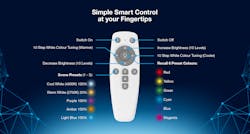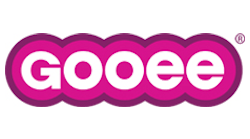Aurora simplifies smart home lighting with Bluetooth remote control
No technology over the last century has been more associated with “flip of a switch” ease than lighting has. Thus, some users have resisted modern smart lighting schemes that require computer hubs. That in turn has prompted vendors to add hub-less Bluetooth offerings where they previously offered hub-based Zigbee only.
The latest example is Aurora Lighting Group.
The Welwyn Garden City, England-based company is focusing on ease of use in promoting a Bluetooth version of its wireless AOne home smart lighting system, which until now was available only in a hub-based Zigbee version.
The new Bluetooth offering, called Connect.Control, includes a handheld, no-fuss no-muss remote control device, possibly the easiest thing next to simply flipping a switch. For most functions, it doesn’t even require an app.
Out of the box, Connect.Control supports six different colors, five pre-set lighting scenarios, and a variety of brightness and color temperatures.
In announcing Connect.Control, Aurora described it as “a super simple smart solution (that) can be used straight out of the box — there’s absolutely no set up required!”
The same could not be said exactly for the company’s two-plus year-old Zigbee version, which requires a hub. Not that it’s hugely complicated, but there is a layer of information technology setup entailed, something not typically associated with lighting, especially in the home market.
LEDs Magazine asked Aurora if potential users have been discouraged by hub hassles. The company provided a mixed answer.
“We haven’t had any reason to believe that home buyers are deterred by setting up a hub when installing smart lighting, but for smaller projects the hub can seem like a barrier, if for example you are looking to make one room smart,” a spokesperson told us.
We’ll take that as a yes. Certainly, other lighting vendors have over the last couple of years noticed something of an impediment factor with hub-based systems. For example, in June 2019, Signify added Bluetooth control to what was its Zigbee-only Hue line of home smart lights, telling LEDs that Bluetooth was “a step to try to make smart lighting less of a hurdle and more mainstream.”
Last November, Osram similarly added a Bluetooth line to its commercial smart lighting offerings, which until then leaned heavily on gateway-reliant Zigbee systems. “We want to reduce the complexity,” Osram told us at the time.
Like Signify and Osram, Aurora is continuing to also offer the Zigbee technology.
Meanwhile, other technologies such as Wirepas are also battling it out for smart lighting supremacy, with companies including Holland’s Ingy backing the mesh networking scheme.
Even though Aurora is positioning its Bluetooth Connect.Control as out-of-the-box simple, it does not seem to be marketing it through retailers. Rather, it is providing it to wholesalers who sell to installers, the company said. A system can include several different LED bulb types such as E27, B22, and GU10, as well as LED strips.
The remote control allows users to group together different lights and rooms, and to add remotes to a scheme. An app is required if the user wants to edit one of the five pre-programmed scenes, or wants to make the lights respond to music.
The product is currently available in the UK. Aurora also plans to release it in South Africa and Europe.
Connect.Control does not include technology from Gooee, the smart lighting and data specialist closely aligned with Aurora, and which provides hub support and cloud services for the original (Zigbee) version of AOne.
LEDs will bring you more on Gooee and Aurora soon. Changes seem to be afoot, but confirming the details has not been a matter of simply flipping a switch.
MARK HALPER is a contributing editor for LEDs Magazine, and an energy, technology, and business journalist ([email protected]).
For up-to-the-minute LED and SSL updates, why not follow us on Twitter? You’ll find curated content and commentary, as well as information on industry events, webcasts, and surveys on our LinkedIn Company Page and our Facebook page.

Mark Halper | Contributing Editor, LEDs Magazine, and Business/Energy/Technology Journalist
Mark Halper is a freelance business, technology, and science journalist who covers everything from media moguls to subatomic particles. Halper has written from locations around the world for TIME Magazine, Fortune, Forbes, the New York Times, the Financial Times, the Guardian, CBS, Wired, and many others. A US citizen living in Britain, he cut his journalism teeth cutting and pasting copy for an English-language daily newspaper in Mexico City. Halper has a BA in history from Cornell University.






